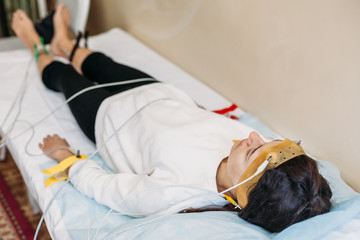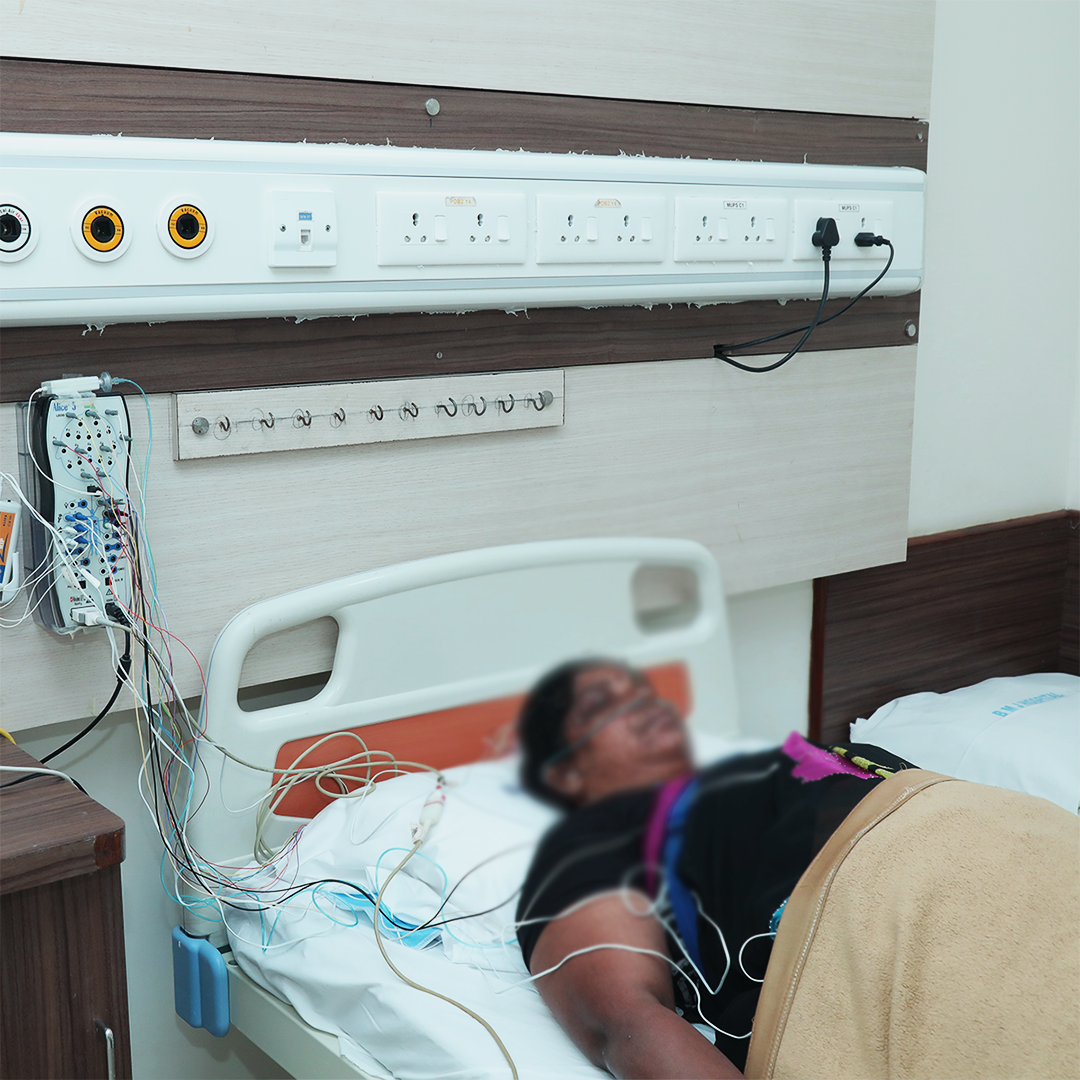All You Required to Find Out About Sleep Studies and Their Function in Detecting Rest Disorders
Sleep researches, or polysomnography, are vital tools in understanding and detecting different rest problems. By keeping track of physiological signals like brain task and heart price, these examinations provide important understandings right into a person's rest patterns. The outcomes can disclose problems such as sleeping disorders and sleep apnea, causing targeted therapy plans. Lots of stay unaware of the different kinds of sleep research studies and their certain processes. Just what can one anticipate throughout a sleep study?
What Are Sleep Researches?
Sleep research studies, likewise known as polysomnography, are diagnostic examinations used to analyze and observe rest patterns and conditions. These tests commonly take place in a regulated environment, such as a rest facility, where clients are kept an eye on overnight. Throughout the research, various physiological signals are recorded, including brain waves, heart rate, oxygen degrees, and muscle mass task (Sleep Study Bangalore). This comprehensive data collection permits health care professionals to recognize sleep-related concerns, such as sleep apnea, sleeplessness, and restless leg disorder. The assessment process not just evaluates the amount of sleep yet likewise its quality, assisting to pinpoint irregularities. Sleep researches are necessary for developing ideal treatment strategies, as they offer understandings into the underlying reasons of sleep disruptions. By understanding a person's unique sleep style, doctor can recommend way of life changes, drug, or added treatments to improve general rest health and wellness and health
Sorts Of Rest Researches
While various kinds of sleep research studies exist, they are primarily categorized based upon the particular conditions being examined and the methods used. One usual kind is polysomnography (PSG), which tape-records mind waves, oxygen degrees, heart price, and breathing during sleep. This comprehensive analysis is particularly beneficial for diagnosing sleep apnea, sleep problems, and various other rest disorders.
An additional kind is home rest apnea screening (HSAT), which offers a simplified variation of PSG for people suspected of having sleep apnea. This method enables keeping track of in a familiar atmosphere, improving convenience and ease.
Actigraphy is another approach, utilizing a wrist-worn device to track movement patterns, consequently giving understandings right into sleep-wake cycles. Ultimately, numerous rest latency examinations (MSLT) review daytime drowsiness and help diagnose narcolepsy by measuring how quickly an individual sleeps during the day. Each type of rest research offers a distinct purpose in understanding rest wellness.

Exactly How Rest Researches Are Conducted
Sleep research studies are performed via numerous techniques, each made to assess specific aspects of sleep actions and physiology. During these studies, keeping an eye on devices tracks mind task, heart rate, and breathing patterns to collect extensive information. This details is important for identifying sleep disorders and identifying effective treatment alternatives.
Kinds Of Rest Researches

Monitoring During Sleep

Common Rest Disorders Diagnosed
Generally come across in clinical setups, sleep disorders include a variety of conditions that substantially affect a person's lifestyle. Amongst the most prevalent are sleep problems, identified by trouble falling or remaining asleep; sleep apnea, which involves repeated disruptions in breathing throughout sleep; and uneasy legs disorder, marked by an alluring impulse to move the legs. Narcolepsy is one more substantial problem, causing too much daytime sleepiness and unexpected rest strikes - Sleep Study Bangalore. Additionally, parasomnias, such as sleepwalking or night horrors, disrupt sleep with irregular actions. These problems can have profound effects, including damaged cognitive feature, state of mind disturbances, and boosted threat of persistent health issues. Accurate medical diagnosis of these problems commonly counts on complete rest studies, which help identify particular problems and overview effective treatment methods. Recognizing the nature and signs and symptoms of these usual rest problems is essential for boosting person end results and boosting total well-being
Understanding the Results of Rest Researches
While translating the outcomes of rest researches might appear challenging, a clear understanding of the data can greatly assist in detecting rest problems. Sleep studies, or polysomnographies, offer comprehensive insights right into a person's rest patterns, consisting of brain task, eye motion, heart rate, and oxygen levels. Each of these components can disclose vital info about sleep top quality and disruptions.
Trick metrics consist of the Apnea-Hypopnea Index (AHI), which suggests the intensity of sleep apnea, and sleep stages, which aid examine the amount of restorative rest. Patterns of fragmented sleep or prolonged wakefulness may signal various other conditions, such as insomnia or restless leg disorder.
Furthermore, hypnograms visually stand for sleep cycles, enabling experts to pinpoint certain issues. By analyzing these outcomes, medical care professionals can create a much more accurate medical diagnosis, resulting in targeted interventions for boosted rest health and total well-being. Recognizing these results is vital for efficient management of sleep-related problems.
Treatment Alternatives Complying With a Rest Study
After analyzing the outcomes of a sleep research, clients and doctor can check out various therapy alternatives tailored to details sleep problems. For conditions like obstructive rest apnea, continuous positive respiratory tract pressure (CPAP) treatment is typically suggested to maintain airways open during rest. In cases of sleeplessness, cognitive behavior modification for sleeplessness (CBT-I) offers efficient strategies to enhance rest patterns. Drugs may also be suggested on a short-term basis however are usually not a first-line therapy. For restless legs syndrome, way of living modifications, iron supplements, or dopaminergic drugs may be suggested. Those identified with narcolepsy may take advantage of stimulant medicines to take care of too much daytime drowsiness. Additionally, attending to hidden health issues, such as obesity or stress and anxiety, can considerably boost rest quality. Generally, therapy plans are embellished, taking into consideration the client's certain medical diagnosis and personal health and wellness circumstances to optimize outcomes.
Tips for Preparing for a Rest Research
Planning for a rest research study can considerably improve the accuracy of the results, as clients who follow particular standards are most likely to have an effective experience. To ensure excellent problems for the research study, people ought to maintain their regular rest routine in the see it here days leading up to the visit. It is recommended to stay clear of caffeine and alcohol 1 day before the study, as these materials can interfere with rest patterns.
Individuals ought to also consult their doctor pertaining to medicines, as some may require to be adjusted or held back prior to the research. Furthermore, wearing comfy, loose-fitting apparel can assist promote leisure during the evening. Bringing personal products such as a favorite cushion or blanket might also add to a more relaxed environment. Ultimately, reaching the center in a timely manner allows for essential preparations and lowers any type of stress and anxiety connected with the study. Adhering to these tips can cause even more purposeful and accurate outcomes.
Frequently Asked Concerns
Are Rest Researches Covered by Insurance Policy?
Rest researches are typically covered by insurance policy, but protection varies by strategy and specific circumstances. Patients must consult their insurance policy provider to validate details advantages and possible out-of-pocket prices associated with the my site rest study.
Can I Take Medications Before a Sleep Study?

Individuals are typically recommended to stay clear of taking drugs prior to a rest research study, as specific materials might interfere with the results. Consulting a doctor for details standards customized to one's scenario is recommended.
How Do I Choose a Sleep Center?
To select a sleep center, one ought to take into consideration aspects such as accreditation, offered technology, staff certifications, individual evaluations, location, and whether the facility supplies extensive solutions customized to certain sleep disorders.
What Should I Put on Throughout a Sleep Study?
For a rest research study, comfortable, baggy sleepwear is advised. It ought to allow very easy motion and not restrict sensing units. Prevent heavy fabrics and difficult outfit to ensure a relaxing rest experience throughout the assessment.
For how long Does It Require To Get Results?
Arise from a sleep research typically take one to two weeks to be refined and examined by specialists. People ought to anticipate to get a comprehensive report detailing findings and possible recommendations soon afterwards.
Rest research studies, additionally understood as polysomnography, are diagnostic tests utilized to observe and evaluate sleep patterns and conditions. Rest research studies are important for establishing ideal treatment plans, as they give understandings into the underlying reasons of rest disruptions. Exactly how are rest studies performed to guarantee exact monitoring of rest patterns? While interpreting the outcomes of sleep researches might seem intimidating, a clear understanding Recommended Reading of the data can significantly aid in diagnosing rest problems. Secret metrics include the Apnea-Hypopnea Index (AHI), which suggests the seriousness of rest apnea, and rest stages, which help evaluate the amount of corrective rest.